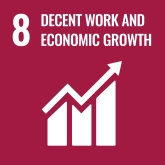The 1st goal: No Poverty - The 8th goal: Decent work and Economic Growth
The 1st goal: No Poverty (Improving standard of living through providing job opportunities):
The Ministry of Labour has continued its great efforts to improve employment, develop national skills and provide job security for the citizens through implementation of different initiatives, projects and national plans. Those efforts were positively reflected on the 2024 labour market indicators, where 27,147 citizens were employed during the period from January to December with an achievement rate of 136% of the annual goal that was set in the plan of economic recovery equaling 20,000 jobs. In addition to that, 19,859 citizens were trained in different training fields, which equal 199% of the annual goal of training 10,000 Bahrainis, which reflects the continuous improvement the efficiency of the employment policies and the efforts of enabling national workforce. In addition to that, the social welfare was enhanced through increasing the compensation and unemployment aid as well as extending the compensation and unemployment aid entitlement period from six to nine months, which contributes to providing a good standard of living during periods of unemployment.
Initiatives (Better Living through Employment):
Under the National Employment Program, launched in 2019, the amount of unemployment compensation offered to first time Bahraini job seekers was increased, as was the compensation period for unfair dismissal, from six to nine months. The Ministry of Labour, which reviews unemployment cases, also provides training for the unemployed and assists in finding suitable job opportunities.
Goal One: End poverty in all its forms everywhere
The 8th goal: Decent work and Economic Growth (Supporting economic recovery plan and improving organizational coordination):
In the framework of the commitment of the Kingdom of Bahrain of the 8th goal of the sustainable development goals, which aims to improve the comprehensive economic growth and providing suitable job opportunities, the government continues its efforts within the plan of economic recovery. The approval of the plan of the labour market for the period from 2023 to 2026 came to ensure strong coordination between the Ministry of Labour, Labour Market Regulatory Authority and Labour Fund "Tamkeen" and all related entities in the fields of creating specific job opportunities and aligning education outcomes with needs of the labour market and increasing the level of supervision and organization to support the stability and growth of the labour market and improve the competitiveness of the Bahraini citizen. In 2024, tangible results were achieved, which were represented in employing 27,147 Bahraini citizens with an achievement rate of 136% of the published annual goal and training19,859 citizens with a rate of 199% of the specified goal within the specified track in the economic recovery plan. Those numbers reflect the success of the shared policies in increasing the level of qualification and providing specific job opportunities in different sectors including the prioritized sectors such as technology, digital economy and medical and financial services. The economic recovery plan relies in its labour market part on the integration between three parties where the Ministry of Labour takes the role drawing policies for the work environment and the labour Market Regulatory Authority supervises and manages expatriate workers while "Tamkeen" provides the financial and technical support for the job seekers and employers. That organizational integration contributes to achieving sustainable balance between supply and demand of jobs and stimulating the private sector to incorporate the national competencies which improves job opportunities and matches futuristic economic shifts.
Initiatives (Labour Market Reform):
The National Employment Program, launched in 2019, comprised of four key initiatives: launching an awareness campaign to encourage citizens to register, hence improving labour market records, increasing unemployment compensation, increasing expatriate fees, and redesigning Tamkeen’s Training and Wage Support Program. A year later, the National Employment Program 2.0 was launched, offering wage support for Bahraini job seekers and new graduates registered with the Ministry of Labour for a period of up to 36 months. Under the Economic Recovery Plan in 2021, the Government launched initiatives to further empower Bahraini youth and facilitate their entry into the private sector. These measures have successfully led to the employment of 29,995 Bahrainis in 2022, surpassing the annual target of 20,000.The Ministry of Labour continues to explore different innovative ways to train Bahrainis and connect them with employers, including electronic job fairs; the launch of a digital portal for job seekers; the provision of professional training and career guidance; and apprenticeship programs. The Labour Market Regulatory Authority (LMRA) is responsible for regulating expatriate employment with the aim of maintaining an organized labour market that meets the needs of its users, preserves the rights of all its parties, achieves social security, and ensures economic growth. Key protections available to expatriate employees include the establishment of the Wage Protection System, that went into effect in May 2021, which gives the LMRA visibility to monitor the payment of salaries to employees, and the establishment of the ‘Expat Protection Center’, a central hub curated towards providing services to expatriate employees, which includes a legal clinic to provide legal support and assistance in filing cases, passport retrieval services, and a shelter for victims and potential victims of human trafficking.

